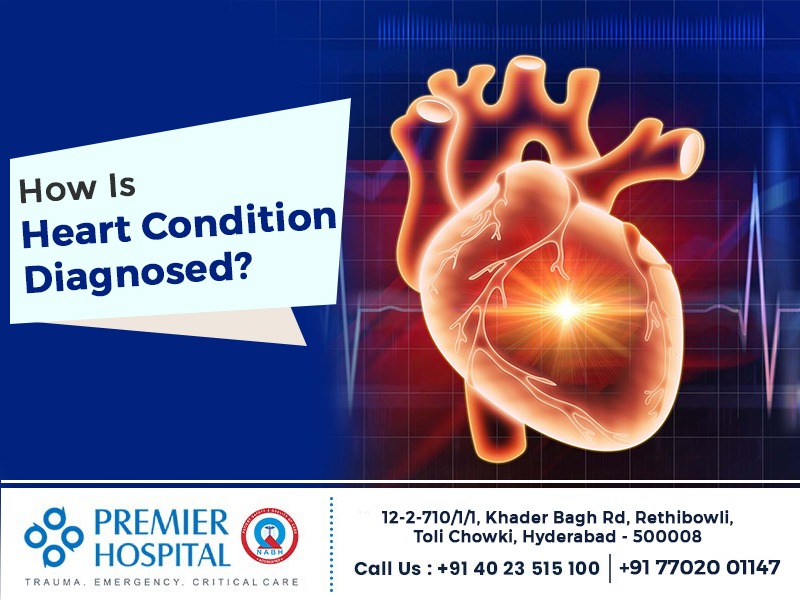How is Heart Conditions diagnosed?
by Premier Hospitals | August 21, 2021 |
Heart disease is defined as a health condition that affects the functions of your heart. Numerous tests are available to diagnose various heart diseases. According to some trusted sources, deaths from cardiovascular diseases range from 1.6% to 7.4% in rural areas and from 1% to 13.2% in urban areas of India. It has become one of the leading causes of death over the past decades in both men & women. Typically, a series of tests and evaluations will be conducted by your doctor in order to diagnose any heart disease. You may also be screened for heart disease with some of the tests before you develop serious signs. The most common diagnostic tests to evaluate heart disease are as follows A doctor may recommend a variety of tests to evaluate the condition of your heart and to design the best treatment plan. Blood tests When your heart muscle is damaged as a result of a heart attack, certain substances are released into your bloodstream. By measuring the substances in your blood, the doctor can estimate the degree of damage your heart muscle has sustained. The blood is also tested for other substances that can be found in your body, including fats, vitamins, and minerals. Your blood sample is collected from one of the veins in your arm. It is then sent to a laboratory and the results are again sent to your doctor. He will analyze them and explain the actual problem to you. Electrocardiogram (ECG) ECGs are used to record the electrical impulses of the heart. It demonstrates how healthy your heart is beating. Small sticky dots are placed on your chest, arms, and legs, along with wire leads. The leads are connected to an ECG machine and it records the electrical impulses of your heart and then prints on paper. Heart attacks and abnormal heart rhythms (technically called ‘arrhythmias’) can be diagnosed with the help of an ECG test. Exercise stress test Your doctor might need to observe you to diagnose certain heart problems when you are actively engaged in strenuous activities. The stress test may involve riding a stationary bike or walking or running on a treadmill for a few minutes. They will observe your body’s response to stress as your heartbeat climbs during this test. Echocardiogram (ultrasound) An echocardiogram is another common test to diagnose heart conditions. This procedure uses ultrasound, a type of X-ray, to obtain a picture of your heart. A probe is placed on your chest and moved along to get the heart image. This test allows your doctor to determine whether your heart's valves and chambers are in good shape, and how strong your heart is pumping blood. Nuclear cardiac stress test Often this test is called an 'exercise thallium scan’, or ‘exercise nuclear scan’. The test involves injecting a radioactive substance known as a 'tracer' into your blood. It travels all the way to your heart to deliver energy. With the help of some special cameras, a picture of this energy is taken from outside of your body. Your doctor will analyze these pictures and determine the amount of blood flowing into your heart muscle and how efficiently your heart pumps blood at rest and while doing physical activity. Consequently, the test can reveal if your heart muscle has been damaged. Coronary angiogram Coronary angiograms are sometimes referred to as 'cardiac catheterizations' often performed after a heart attack or angina. A small tube called a catheter is placed in one of your arteries located in your groin, arm or wrist. Then the catheter is pushed up until it reaches your heart. A special dye is injected into your heart’s blood vessels and then an X-ray is taken. Seeing the X-ray the doctor can tell where your coronary arteries have been clogged or blocked. In addition, it indicates how well your heart is pumping blood. Coronary angiograms tests can assist doctors in deciding on a better treatment plan for you. Magnetic resonance imaging (MRI) An MRI is a strong imaging test that uses radio waves in order to produce clear images of your heart on a computer. The device can capture still or moving images of your heart. In some cases, a special dye is applied to get a precise view of your coronary arteries and parts of the heart. This test allows a doctor to diagnose heart muscle diseases so that they can determine which treatment is best for you. Coronary computed tomography angiogram (CCTA) CCTA is a specialised type of scan which helps to diagnose coronary artery disease such as narrowed arteries due to plaque buildup. People who have been experiencing unusual cardiac symptoms may benefit from this non-invasive test. Sometimes non-invasive tests are enough to diagnose heart conditions but sometimes invasive tests are inevitable to diagnose certain heart problems. One way or the other, our cardiologists at Premier Hospital can identify your problems and provide a permanent solution. For any heart-related problems consult heart specialists in Hyderabad. Call 040-23515100, +91-83747 18100 to book a consultation with our experts.




